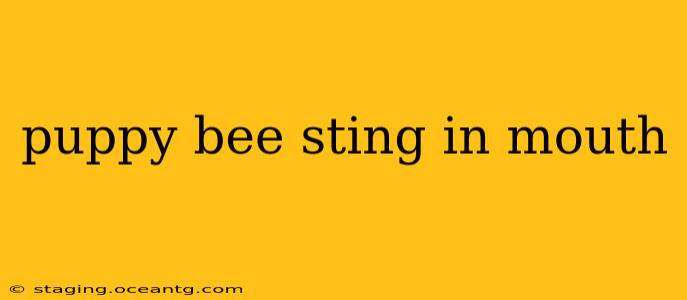A bee sting in a puppy's mouth is a serious situation requiring immediate attention. The swelling, pain, and potential allergic reaction can be life-threatening. This guide will walk you through recognizing the symptoms, providing first aid, and seeking veterinary care.
What Happens When a Puppy Gets a Bee Sting in its Mouth?
Bee stings in the mouth are particularly dangerous for puppies because of the potential for airway obstruction. The venom injected can cause immediate pain and swelling, making it difficult for your puppy to breathe. Additionally, the location of the sting makes it harder to remove the stinger and administer treatment. Some puppies may experience a severe allergic reaction (anaphylaxis), a life-threatening condition requiring immediate medical intervention.
How to Identify a Bee Sting in Your Puppy's Mouth
Recognizing the signs of a bee sting is crucial for prompt action. Look for:
- Visible Swelling: The area around the sting will likely be swollen and red. This swelling can quickly spread, particularly in the mouth and throat.
- Excessive Drooling: Your puppy may drool excessively due to pain and irritation.
- Pawing at the Mouth: They might constantly paw or rub at their mouth, indicating discomfort.
- Difficulty Breathing: This is a critical sign, indicating airway compromise. Look for labored breathing, wheezing, or gasping.
- Restlessness and Anxiety: Your puppy will likely be distressed and agitated.
- Vomiting: Some puppies may vomit due to the pain and inflammation.
- Hives or Rash: In cases of allergic reaction, hives or a rash may develop on the body.
What to Do If Your Puppy Gets a Bee Sting in its Mouth
Immediate Action is Critical:
- Remove the Stinger (if visible): Carefully use a dull-edged instrument like a credit card to scrape the stinger away. Avoid using tweezers, as squeezing the stinger can release more venom.
- Rinse the Mouth: Gently rinse your puppy's mouth with cool water. Avoid using force, as this can worsen the swelling.
- Cold Compress: Apply a cold compress (ice wrapped in a cloth) to the affected area to reduce swelling.
- Monitor Breathing: Closely observe your puppy's breathing. Any difficulty breathing requires immediate veterinary attention.
- Contact Your Veterinarian or Emergency Veterinary Clinic IMMEDIATELY: This is not a situation to wait and see. Your vet will assess the severity of the sting and provide appropriate treatment, which may include antihistamines, corticosteroids, or even epinephrine in severe cases.
What if My Puppy is Having an Allergic Reaction?
Anaphylaxis, a severe allergic reaction, can manifest rapidly and is life-threatening. Signs include:
- Difficulty Breathing or Wheezing
- Swelling of the Face, Lips, or Tongue
- Hives or Rash
- Vomiting or Diarrhea
- Collapse or Weakness
If you suspect an allergic reaction, seek immediate veterinary attention or call emergency services. Time is of the essence in these situations.
How Can I Prevent Bee Stings in My Puppy?
Prevention is always the best approach. Here are some tips:
- Supervise Your Puppy Outdoors: Keep a close eye on your puppy when they are playing outside, particularly near flowering plants or areas known to attract bees.
- Avoid Areas with Bees: Stay away from beehives, flowering plants, and areas where bees are known to congregate.
- Train Your Puppy: Teach your puppy to avoid bees and other stinging insects. Positive reinforcement training can be effective.
Can I Give My Puppy Benadryl for a Bee Sting?
While Benadryl (diphenhydramine) is an antihistamine often used to treat allergic reactions in humans, you should never administer any medication to your pet without consulting your veterinarian first. The dosage for dogs is significantly different from that for humans, and incorrect dosing can be harmful. Your vet can determine the appropriate medication and dosage based on your puppy's size, weight, and specific situation.
My Puppy is Still Swollen After the Vet Visit. What Should I Do?
Continued swelling after veterinary treatment warrants another visit to your vet. They can assess the situation and determine if additional treatment is needed. Closely follow your vet’s instructions regarding aftercare.
This information is for general guidance only and does not constitute veterinary advice. Always consult with a veterinarian for any health concerns related to your pet. A prompt response to a bee sting in the mouth can significantly improve your puppy's outcome.
